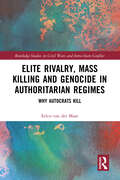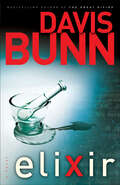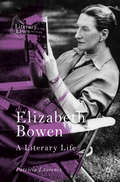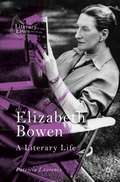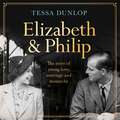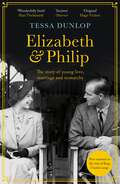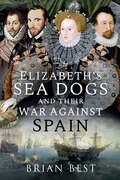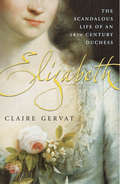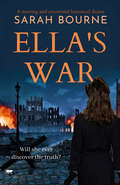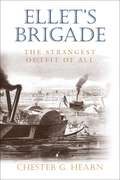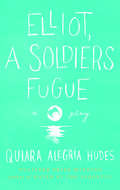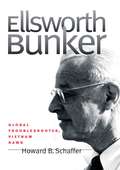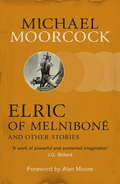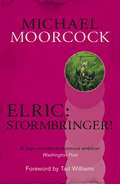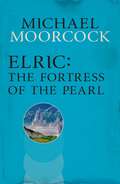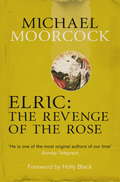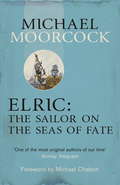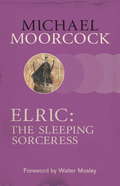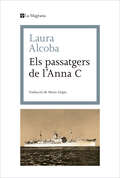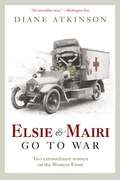- Table View
- List View
Elite Rivalry, Mass Killing and Genocide in Authoritarian Regimes: Why Autocrats Kill (Routledge Studies in Civil Wars and Intra-State Conflict)
by Eelco van der MaatThis book explains how mass killing is driven by elite politics within authoritarian regimes.Mass killing and genocide defy reason and explanation. How can genocidal elites present defenceless victims as an existential threat? Why use indiscriminate killing that drives victims to coordinated resistance? Mass killing seems counterproductive, irrational, and therefore inherently ideological. By building on new insights on authoritarian politics, this book argues that mass killing is not ideological, but instead is a rational response to elite rivalry within authoritarian regimes. Mass killing is therefore not driven by rivalries between groups, but by elite rivalry within groups. In Rwanda, for example, the genocide was not driven by conflicts between Hutu and Tutsi, but by conflicts within the Hutu regime. The work demonstrates how mass killing helps elites build coalitions with groups that benefit from violence and how it divides support coalitions of rival elites. Mass killing can therefore help elites win dangerous internal rivalries. By qualitatively and quantitatively exploring elite rivalry and mass killing, this book provides a new explanation for a host of mass killings and genocides. It demonstrates that well-known genocides, such as the Rwandan and Cambodian genocides, which are seemingly ideological are instead better explained by elite rivalry. Mass killing is therefore not driven by the random madness of leaders, nor by the desire to kill an outgroup, but by the internal threats that authoritarian elites face.This book will be of much interest to scholars and students of civil wars, genocide, political violence, and International Relations in general.
Elixir
by Davis BunnAgainst a backdrop of international intrigue and ruthless drug monopolies, award-winning author Davis Bunn delivers an intoxicating page-turner in this redemptive thriller.Multi-billion dollar giant Revell Pharmaceuticals is devouring its competition. A new research breakthrough propels the company into releasing its most profitable product ever. Yet a family crisis confronts them when Kirra Revell, heiress to the empire, goes missing. Taylor Knox, an employee of Revell's latest acquisition, is blackmailed into leading the search. An expert surfer, Taylor pursues the world's biggest waves as a cover, only to be ensnared in a deadly contest of corporate espionage. In the race to find Kirra, everyone's motives are suspect. A Celtic monk's warning only heightens the peril. Is it money, power, passion, or something deeper that compels Taylor to risk everything? From Scotland's holy islands to the rugged Basque coast of Spain, from boardrooms and luxury yachts to the dungeons of America's oldest surviving fortress, the hunt is on. Can Taylor Knox achieve his quest before time runs out for Kirra Revell -- and for himself?
Eliza Pinckney: Women Of Colonial And Revolutionary Times
by Harriott Horry RavenelDiscover the remarkable life and legacy of one of Colonial America's most influential women in Harriott Horry Ravenel's captivating biography, "Eliza Pinckney." This meticulously researched book delves into the extraordinary story of Eliza Lucas Pinckney, whose innovations in agriculture and contributions to society left an indelible mark on the American South.Born in Antigua and raised in South Carolina, Eliza Pinckney's life was marked by resilience, intelligence, and a pioneering spirit. At a young age, she assumed the management of her family's plantations and began experimenting with indigo cultivation, a crop that would become a cornerstone of South Carolina's economy. Ravenel’s biography vividly portrays Eliza's innovative agricultural techniques and her success in establishing indigo as a profitable export, which had a lasting impact on the region’s prosperity.Through engaging narrative and rich historical detail, Ravenel captures Eliza’s multifaceted life, including her role as a devoted mother, wife, and community leader. The book highlights her correspondence with key figures of the time, providing insights into her thoughts and the challenges she faced as a woman in a predominantly male-dominated society."Eliza Pinckney" also explores her broader contributions to American history, from her influence on education and social welfare to her role in shaping the political landscape through her sons, Charles Cotesworth Pinckney and Thomas Pinckney, who became prominent statesmen.Ravenel's biography is not just a tribute to Eliza Pinckney's accomplishments but also a window into the complexities of colonial life and the pivotal role women played in shaping early American society.
Elizabeth Bowen: A Literary Life (Literary Lives)
by Patricia LaurenceElizabeth Bowen: A Literary Life reinvents Bowen as a public intellectual, propagandist, spy, cultural ambassador, journalist, and essayist as well as a writer of fiction. Patricia Laurence counters the popular image of Bowen as a mannered, reserved Anglo-Irish writer and presents her as a bold, independent woman who took risks and made her own rules in life and writing. This biography distinguishes itself from others in the depth of research into the life experiences that fueled Bowen’s writing: her espionage for the British Ministry of Information in neutral Ireland, 1940-1941, and the devoted circle of friends, lovers, intellectuals and writers whom she valued: Isaiah Berlin, William Plomer, Maurice Bowra, Stuart Hampshire, Charles Ritchie, Sean O’Faolain, Virginia Woolf, Rosamond Lehmann, and Eudora Welty, among others. The biography also demonstrates how her feelings of irresolution about national identity and gender roles were dispelled through her writing. Her vivid fiction, often about girls and women, is laced with irony about smooth social surfaces rent by disruptive emotion, the sadness of beleaguered adolescents, the occurrence of cultural dislocation, historical atmosphere, as well as undercurrents of violence in small events, and betrayal and disappointment in romance. Her strong visual imagination—so much a part of the texture of her writing—traces places, scenes, landscapes, and objects that subliminally reveal hidden aspects of her characters. Though her reputation faltered in the 1960s-1970s given her political and social conservatism, now, readers are discovering her passionate and poetic temperament and writing as well as the historical consciousness behind her worldly exterior and writing.
Elizabeth Bowen: A Literary Life (Literary Lives)
by Patricia LaurenceElizabeth Bowen: A Literary Life reinvents Bowen as a public intellectual, propagandist, spy, cultural ambassador, journalist, and essayist as well as a writer of fiction. Patricia Laurence counters the popular image of Bowen as a mannered, reserved Anglo-Irish writer and presents her as a bold, independent woman who took risks and made her own rules in life and writing. This biography distinguishes itself from others in the depth of research into the life experiences that fueled Bowen’s writing: her espionage for the British Ministry of Information in neutral Ireland, 1940-1941, and the devoted circle of friends, lovers, intellectuals and writers whom she valued: Isaiah Berlin, William Plomer, Maurice Bowra, Stuart Hampshire, Charles Ritchie, Sean O’Faolain, Virginia Woolf, Rosamond Lehmann, and Eudora Welty, among others. The biography also demonstrates how her feelings of irresolution about national identity and gender roles were dispelled through her writing. Her vivid fiction, often about girls and women, is laced with irony about smooth social surfaces rent by disruptive emotion, the sadness of beleaguered adolescents, the occurrence of cultural dislocation, historical atmosphere, as well as undercurrents of violence in small events, and betrayal and disappointment in romance. Her strong visual imagination—so much a part of the texture of her writing—traces places, scenes, landscapes, and objects that subliminally reveal hidden aspects of her characters. Though her reputation faltered in the 1960s-1970s given her political and social conservatism, now, readers are discovering her passionate and poetic temperament and writing as well as the historical consciousness behind her worldly exterior and writing.
Elizabeth and Philip: A Story of Young Love, Marriage and Monarchy
by Tessa DunlopShe was peaches-and-cream innocence; he was a handsome war hero. Both had royal blood coursing through their veins. The marriage of Britain's Princess Elizabeth to Lt Philip Mountbatten in November 1947 is remembered as the beginning of an extraordinary, lifelong union but success was not guaranteed. Elizabeth and Philip: A Story of Young Love, Marriage and Monarchy plunges us back into 1940s Britain where a teenage Princess fell in love with a foreign Prince. Cue fears of a flirtatious 'Greek' fortune hunter stealing off with England's crown jewel and subsequent efforts by the Establishment to reframe Philip as the perfect fit for Britain's most famous family.Drawing on original newspaper archives and the opinions of Elizabeth and Philip's contemporaries still alive today, historian Dr Tessa Dunlop discovers a post-war world on the cusp of major change. Unprecedented polling on Philip's suitability was a harbinger of pressures to come for a couple whose marriage was branded the ultimate global fairytale. Theirs was a partnership like no other. Six years after Elizabeth promised to be an obedient wife Philip got down on bended knee and committed himself as the Queen's 'liege man of life and limb.'Published to coincide with the 75th anniversary of their marriage, this deeply touching history explores the ups and downs, the attraction and the tensions that defined an extraordinary relationship. The high stakes involved might have devoured a less committed pair - but not Elizabeth and Philip. They shared a common purpose, one higher even than marriage, with roots much deeper than young love. Happy and Glorious, for better or for worse, they were heavily invested in a God-given mission. Monarchy was the magic word.(P) 2022 Headline Publishing Group Ltd
Elizabeth and Philip: A Story of Young Love, Marriage and Monarchy
by Tessa DunlopShe was 'sugar pink' innocence; he was a handsome war hero. Both had royal blood coursing through their veins. The marriage of Britain's Princess Elizabeth to Lieutenant Philip Mountbatten in November 1947 is remembered as the beginning of an extraordinary, lifelong union but success was not guaranteed. Elizabeth and Philip: A Story of Young Love, Marriage and Monarchy plunges us back into the 1940s when a teenage princess fell in love with a foreign prince. Cue fears of a flirtatious 'Greek' fortune hunter stealing off with Britain's crown jewel and Philip's supporters scrambling to reframe him as a good fit for the Royal Family. Drawing on original newspaper archives and the opinions of Elizabeth and Philip's contemporaries, historian Dr Tessa Dunlop discovers a post-war world on the cusp of major change. Unprecedented polling on Philip's suitability was a harbinger of pressures to come for a couple whose marriage was branded the ultimate global fairytale. Theirs was a partnership like no other. Six years after Elizabeth promised to be an obedient wife Philip got down on bended knee at the coronation and committed himself as the Queen's 'liege man of life and limb.' Published 75 years after their marriage, this deeply touching history explores the ups and downs, the public appeal and the private tensions that defined an extraordinary relationship. The high stakes involved might have devoured a less committed pair - but Elizabeth and Philip shared a common purpose, one higher even than marriage, with roots much deeper than young love. Happy and Glorious, for better or for worse, how did their union succeed? Monarchy was the magic word.
Elizabeth and Philip: A Story of Young Love, Marriage and Monarchy
by Tessa DunlopShe was 'sugar pink' innocence; he was a handsome war hero. Both had royal blood coursing through their veins. The marriage of Britain's Princess Elizabeth to Lieutenant Philip Mountbatten in November 1947 is remembered as the beginning of an extraordinary, lifelong union but success was not guaranteed. Elizabeth and Philip: A Story of Young Love, Marriage and Monarchy plunges us back into the 1940s when a teenage princess fell in love with a foreign prince. Cue fears of a flirtatious 'Greek' fortune hunter stealing off with Britain's crown jewel and Philip's supporters scrambling to reframe him as a good fit for the Royal Family. Drawing on original newspaper archives and the opinions of Elizabeth and Philip's contemporaries, historian Dr Tessa Dunlop discovers a post-war world on the cusp of major change. Unprecedented polling on Philip's suitability was a harbinger of pressures to come for a couple whose marriage was branded the ultimate global fairytale. Theirs was a partnership like no other. Six years after Elizabeth promised to be an obedient wife Philip got down on bended knee at the coronation and committed himself as the Queen's 'liege man of life and limb.' Published 75 years after their marriage, this deeply touching history explores the ups and downs, the public appeal and the private tensions that defined an extraordinary relationship. The high stakes involved might have devoured a less committed pair - but Elizabeth and Philip shared a common purpose, one higher even than marriage, with roots much deeper than young love. Happy and Glorious, for better or for worse, how did their union succeed? Monarchy was the magic word.
Elizabeth's Sea Dogs and their War Against Spain
by Brian BestThis maritime history recounts the exploits of sixteenth century English privateers in conflict with the Spanish Empire.The Sea Dogs were seafaring merchants who originally traded mainly with Holland and France. During Queen Elizabeth’s reign, however, they began sailing further afield, spreading the reach of English exploration and plundering. At that time, England was a relatively impoverished country. But it soon found a new source of wealth in the Caribbean—a region that had been the colonial domain of wealthy Catholic Spain.The first man to trade with the Spanish Main was John Hawkins, who traveled to West Africa, captured the natives and transported them to the Caribbean. There he sold them to plantation owners in exchange for goods such as pearls, hides, and spices. His backers included the Queen herself, who encouraged the Sea Dogs to seek greater riches. This led to conflict with Spanish ships that would spark the Anglo-Spanish War.The main thorn in the Spanish side was Francis Drake. Despite efforts to kill or capture him, he continued to plunder the high seas, bringing back Spanish riches to England. This allowed Elizabeth to flourish. It was thanks in main to the privateering exploits of the Sea Dogs that England became so wealthy, paving the way for the Renaissance that followed.
Elizabeth: The Scandalous Life of an 18th Century Duchess
by Claire GervatElizabeth Chudleigh was one of the eighteenth century's most colourful characters. Born into impoverished gentility, her beauty, wit and vitality soon earned her a place at the centre of court life. When she married the Duke of Kingston in 1769 she had reached the highest rung of the social ladder. But Elizabeth was carrying a dark secret. In 1744 she had secretly married a naval lieutenant called Augustus Hervey, and after the Duke's death her first marriage was discovered. Bigamy fever swept London society and, in a very public trial, Elizabeth was found guilty. But her strength of character ensured that, even when her friends deserted her, her courage and zest for life did not. In an engaging history of this strong and wilful woman, Gervat shows there was far more to Elizabeth than the caricature villain her contemporaries made her out to be.
Ella Morris: A Novel
by John David MorleySpanning the decades from WWII to the Yugoslav conflict, Ella Morris is the story of a continent, and of a woman torn between two men. Born in Berlin on the eve of Hitler's rise to power, Ella Andrzejewski escapes Soviet-occupied europe and finds a safe haven in England. Here, she marries George Morris but falls passionately in love with a French student ten years her junior. The ramifications of this love triangle and of Ella's traumatic past will reverberate through the generations, as her children try to find their own troubled peace in a continent still scarred by war.
Ella Morris: A Novel
by John David MorleySpanning the decades from WWII to the Yugoslav conflict, Ella Morris is the story of a continent, and of a woman torn between two men. Born in Berlin on the eve of Hitler's rise to power, Ella Andrzejewski escapes Soviet-occupied europe and finds a safe haven in England. Here, she marries George Morris but falls passionately in love with a French student ten years her junior. The ramifications of this love triangle and of Ella's traumatic past will reverberate through the generations, as her children try to find their own troubled peace in a continent still scarred by war.
Ella's War: A Moving and Emotional Historical Drama
by Sarah BourneA World War II nurse finds herself in a hospital bed with no memory of how she got there in this dramatic historical novel by the author of The Train.1947. Ella Elkington wakes up in hospital with minor physical injuries but no memory. She cannot even remember her own name.The doctor treating her tells her that she had a car accident and has been identified by a letter found in a handbag. Asking to see the letter, hoping to find out about herself, she learns the letter is now missing.When the hospital tracks down her brother, he visits her, and Ella has glimmers of childhood memories. After she is released from hospital, with the help of diaries and letters, and her long-time friend Sheila, Ella begins to piece together her past. She learns she was a nurse during the war, who was sent to work in a mobile hospital in France after the D-Day landings. But, haunted by nightmares, Ella struggles to understand how she ended up in the accident—as well as what happened to that letter and the man in her dreams.In order to understand who she is, Ella must face a terrible truth in order to make peace with the past and find a way to live again . . . Ella’s War is a captivating historical drama that will appeal to fans of authors like Lucinda Riley and Victoria Hislop.
Elleander Morning (Fantasy Masterworks Ser.)
by Gavriel Rosenfeld Jerry YulsmanA dying woman, given a second chance to relive her life, travels back in time. Her goal: the execution of an obscure Viennese artist named Adolf Hitler. Two generations later, the assassin's granddaughter is mystified to discover a book relating the history of World War II - the chronicle of a conflict that never took place. Elleander Morning spans eight decades of the twentieth century, tracing two different timelines from two very different worlds and raising thought-provoking questions along the way. Part detective story, part thriller, and part romance, this alternative history won the 1986 Ditmar Award for best international fiction and the 1987 Kurd-Laßwitz-Preis. This edition features a new Introduction by Gavriel Rosenfeld, an expert on Nazi Germany and the Holocaust.
Ellet's Brigade: The Strangest Outfit of All
by Chester G. HearnSoon after the start of the Civil War, during the naval buildup on the central Mississippi River, celebrated civil engineer Charles Ellet, Jr., formed the Ram Fleet under U.S. secretary of war Edwin M. Stanton. Perhaps the most bizarre unit organized by the Union, the rams were shunned by both the army and navy as superfluous instruments of war. However, on June 6, 1862, they proved their worth by defeating the Confederate River Defense Fleet ironclads at Memphis while the U.S. Navy simply watched. In this lively study, Chester G. Hearn details the formation and wartime exploits of Ellet's fleet, reviving the history of this fascinating but forgotten brigade.
Elliot, A Soldier's Fugue
by Quiara Alegría Hudes"Elliot, A Soldier's Fugue is that rare and rewarding thing: a theatre work that succeeds on every level while creating something new. The playwright combines a lyrical ear with a sophisticated sense of structure to trace the legacy of war through three generations of a Puerto Rican family. Without ever invoking politics, Elliot, a Soldier's Fugue manages to be a deeply poetic, touching and often funny indictment of the war in Iraq."-The New York TimesFrom Quiara Alegría Hudes, the Pulitzer Prize-winning author of Water by the Spoonful, comes this companion play, itself a Pulitzer finalist.In a crumbling urban lot that has been converted into a verdant sanctuary, a young Marine comes to terms with his father's service in Vietnam as he decides whether to leave for a second tour of duty in Iraq.Melding a poetic dreamscape with a stream-of-consciousness narrative, Elliot, A Soldier's Fugue takes us on an unforgettable journey across time and generations, lyrically tracing the legacy of war on a single Puerto Rican family.Elliot, A Soldier's Fugue, a finalist for the 2007 Pulitzer Prize, is the first installment in a trilogy of plays that follow Elliot's return from Iraq. The second play, Water by the Spoonful, received the 2012 Pulitzer Prize and will be published by Theatre Communications Group concurrently with Elliot, A Soldier's Fugue. The trilogy's final play, The Happiest Song Plays Last, premiered in April 2012 at Chicago's renowned The Goodman Theatre.
Ellsworth Bunker
by Howard B. SchafferIn this first biography of Ellsworth Bunker (1894-1984), Howard Schaffer traces the life of one of postwar America's foremost diplomats from his formative years as a successful businessman and lobbyist through a long career in international affairs.Named ambassador to Argentina by Harry Truman in 1951, Bunker went on to serve six more presidents as ambassador to Italy, India, Nepal, and Vietnam and on special negotiating missions. A widely recognized "hawk," Bunker helped shape U.S. policy in Vietnam during his six-year Saigon posting. Using letters Bunker wrote to his wife as well as recently declassified messages he exchanged with Henry Kissinger, Schaffer examines how Bunker promoted the war effort and how he regarded his mission. After leaving Saigon on his seventy-ninth birthday, Bunker next became a key figure in the treaty negotiations, spanning three presidencies, that radically changed the operation and defense of the Panama Canal.Highlighting Bunker's views on the craft of diplomacy, Schaffer paints a complex picture of a man who devoted three decades to international affairs and sheds new light on post-World War II American diplomacy.This book is part of the ADST-DACOR Diplomats and Diplomacy Series, co-sponsored by the Association for Diplomatic Studies and Training in Arlington, Virginia, and Diplomatic & Consular Officers, Retired, Inc., of Washington, D.C.
Elric of Melniboné and Other Stories
by Michael MoorcockGollancz is very proud to present the author's definitive editions of the saga of Elric, the last emperor of Melniboné. Michael Moorcock and his long-time friend and bibliographer John Davey have collaborated to produce the most consistent and coherent narrative from the disparate novels, novellas, short stories and non-fiction about Elric. From his early life in Melniboné all the way through to his final days, these seven volumes will be the definitive telling of the albino prince's story. Elric is one of the great creations of modern fantasy, and has inspired legions of imitators. If you know his story already, then this definitive edition will finally let you read the entire saga in the author's preferred order. If you've never experienced the chronicles of the albino with the soul-sucking sword, then this is the perfect place to start.
Elric: Stormbringer!
by Michael MoorcockFeared by enemies and friends alike, Elric of Melnibone walks a lonely path among the worlds of the multiverse. The destroyer of his own cruel and ancient race, as well as its final ruler, Elric is the bearer of a destiny as dark and cursed as the vampiric sword he carries - the sentient black blade known as Stormbringer.Containing the novel which perhaps did the most to propel Elric to the forefront of the fantasy genre, along with associated short stories and other material, this volume is a vital part of any fantasy reader's library. With an introduction by Tad Williams, this collection presents Moorcock's greatest creation in a revised and approved order.
Elric: The Fortress of the Pearl
by Michael MoorcockFeared by enemies and friends alike, Elric of Melnibone walks a lonely path among the worlds of the multiverse. The destroyer of his own cruel and ancient race, as well as its final ruler, Elric is the bearer of a destiny as dark and cursed as the vampiric sword he carries - the sentient black blade known as Stormbringer.With an introduction and a short story by Neil Gaiman, and containing complete novels as well as associated short stories, this collection presents Moorcock's greatest creation in a revised and approved order.
Elric: The Revenge of the Rose
by Michael MoorcockFeared by enemies and friends alike, Elric of Melnibone walks a lonely path among the worlds of the multiverse. The destroyer of his own cruel and ancient race, as well as its final ruler, Elric is the bearer of a destiny as dark and cursed as the vampiric sword he carries - the sentient black blade known as Stormbringer.The soul of Elric's father is tortured and suffering. To free it, Elric must face the princes of hell, and put all of his trust in one woman - the Rose.With an introduction by Holly Black, and containing THE REVENGE OF THE ROSE as well as associated short stories, this collection presents Moorcock's greatest creation in a revised and approved order.
Elric: The Sailor on the Seas of Fate
by Michael MoorcockGollancz is very proud to present the author's definitive editions of the saga of Elric, the last emperor of Melniboné. Michael Moorcock and his long-time friend and bibliographer John Davey have collaborated to produce the most consistent and coherent narrative from the disparate novels, novellas, short stories and non-fiction about Elric. From his early life in Melniboné all the way through to his final days, these seven volumes will be the definitive telling of the albino prince's story. Elric is one of the great creations of modern fantasy, and has inspired legions of imitators. If you know his story already, then this definitive edition will finally let you read the entire saga in the author's preferred order. If you've never experienced the chronicles of the albino with the soul-sucking sword, then this is the perfect place to start.Containing stories, novellas, supplementary material and commentary, these editions of Elric are the finest yet.
Elric: The Sleeping Sorceress
by Michael MoorcockGollancz is very proud to present the author's definitive editions of the saga of Elric, the last emperor of Melniboné. Michael Moorcock and his long-time friend and bibliographer John Davey have collaborated to produce the most consistent and coherent narrative from the disparate novels, novellas, short stories and non-fiction about Elric. From his early life in Melniboné all the way through to his final days, these seven volumes will be the definitive telling of the albino prince's story. Elric is one of the great creations of modern fantasy, and has inspired legions of imitators. If you know his story already, then this definitive edition will finally let you read the entire saga in the author's preferred order. If you've never experienced the chronicles of the albino with the soul-sucking sword, then this is the perfect place to start.Containing stories, novellas, supplementary material and commentary, these editions of ELRIC are the finest yet.
Els passatgers de l'Anna C.
by Laura AlcobaEls passatgers de l'Anna C. relata l'increïble viatge realitzat per un grapat de joves revolucionaris argentins a mitjans dels anys seixanta, amb la finalitat d’unir-se al Che Guevara. Estan preparats per donar la seva vida per la Revolució. L’any 1968 el vaixell Anna C. Portava en Manel i la Soledad de tornada a l’Argentina, després de dos anys d’entrenament guerriller a Cuba. Amb ells, hi havia la seva filla acabada de néixer. Llavors duia un altre nom, però és la mateixa Laura Alcoba, l’autora i narradora d’aquesta novel·la, que, passats els anys, ressegueix el periple dels seus pares i altres companys argentins, els quals, enduts per l’ideal revolucionari, van viatjar a Cuba per unir-se al Che i la revolució. Sota l’aspecte d’una investigació que duu a terme l’autora, preguntant als seus pares i als supervivents, i recreant brillantment l’experiència guerrillera dels protagonistes i l’ambient intel·lectual revolucionari, Els passatgers de l’Anna C. és una novel·la escrita amb tant de reconeixement com de distanciat i amable escepticisme, una novel·la feta de petits moments reveladors i escenes on conviuen les il·lusions invencibles de la joventut amb el trencament -pot ser inevitable- que experimenten els somnis en contacte amb la realitat.
Elsie and Mairi Go to War: Two Extraordinary Women on the Western Front
by Diane AtkinsonThe incredible story of two courageous and spirited women who were the only female participants to serve on the western front during World War I. When they met at a motorcycle club in 1912, Elsie Knocker was a thirty year-old motorcycling divorcee dressed in bottle-green Dunhill leathers, and Mairi Chisholm was a brilliant eighteen-year old mechanic, living at home borrowing tools from her brother. Little did they know, theirs was to become one of the most extraordinary stories of World War I. In 1914, they roared off to London 'to do their bit,' and within a month they were in the thick of things in Belgium driving ambulances to distant military hospitals. Frustrated by the number of men dying of shock in the back of their vehicles, they set up their own first-aid post on the front line in the village of Pervyse, near Ypres, risking their lives working under sniper fire and heavy bombardment for months at a time. As news of their courage and expertise spread, the 'Angels of Pervyse' became celebrities, visited by journalists and photographers as well as royals and VIPs. Glamorous and influential, they were having the time of their lives, and for four years Elsie and Mairi and stayed in Pervyse until they were nearly killed by arsenic gas in the spring of 1918. But returning home and adjusting to peacetime life--and the role of women in British society--was to prove more challenging than even the war itself.
